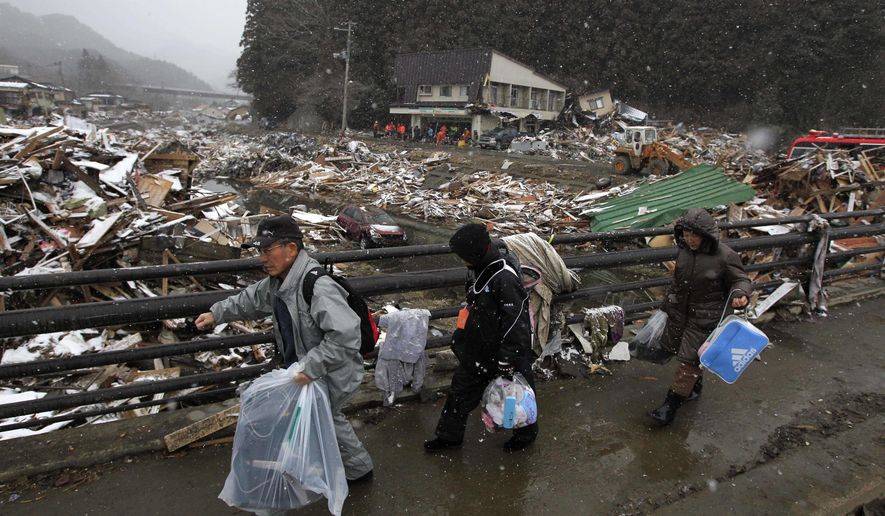HAMAMATSU, Japan | In the first television address by a Japanese monarch, Emperor Akihito on Wednesday tried to calm the nerves of a nation shaken by a massive earthquake and tsunami, with officials gripped in a seesaw fight against nuclear radiation at a shattered power plant.
“It is important that each of us shares the difficult days that lie ahead,” said the soft-spoken, grandfatherly emperor, who suddenly appeared on TV screens across Japan in a prerecorded message that lasted about six minutes.
“I pray that we will all take care of each other and overcome this tragedy.”
Akihito said he is “deeply concerned” about the Dai-ichi power plant in Fukushima province, about 170 miles northeast of Tokyo. The plant was crippled by explosions in four nuclear reactor units and a fire in a fuel-rod cooling pool that released radioactive steam into the air.
As the emperor spoke, some Japanese were losing their characteristic self-control that carried them through the three-pronged disaster that first struck Friday.
“The anxiety and anger being felt by people in Fukushima have reached a boiling point,” Yuhei Sato, the provincial governor, told NHK television news.
He criticized the government’s plans for an evacuation of his province, the hardest-hit region, and complained about a lack of hot meals and basic necessities at shelters housing people moved from the areas closest to the plant.
The nuclear crisis is overshadowing the human toll from the 9.0 magnitude earthquake, the strongest ever recorded in Japan, and from the tsunami with 30-foot-high waves that wiped out entire towns.
Millions of Japanese spent a fifth day with little food, water or heat, as temperatures plunged in the northeast. Police said 452,000 people sought refuge in emergency centers, with many sleeping on the floor of school gymnasiums.
Officials have pegged the death toll at 3,700, but authorities in Fukushima fear the toll will rise to more than 10,000.
Authorities have expanded an evacuation zone around the power plant to more than six miles from 1.2 miles. They have also designated a 12-mile danger zone outside the evacuation area. Residents in the danger zone have been urged to stay in their homes and seal their doors and windows.
The danger zone is ringed with cities that are home to a million people, such as Iwaki, with a population of 340,000, and Fukushima and Koriyama, each with 300,000 residents.
Witnesses said the city of Fukushima resembled a ghost town with empty streets and shuttered shops.
The head of the International Atomic Energy Agency (IAEA) criticized the Japanese government for providing too little information to the Japanese public and the world at large.
“This is not an accident by design or human error,” Yukiya Amano said at IAEA headquarters in Vienna. “The release of radioactive material into the atmosphere is limited. But the Japanese operators have some problem in cooling down the reactors.”
“In situations such as this,” he added, “it is extremely important that the general public, both in Japan and internationally, is kept fully and accurately informed about the situation.”
Mr. Amano, himself a Japanese national, said he plans to fly to Japan for a firsthand look at the crisis.
In Tokyo, government spokesman Yukio Edano said authorities have authorized the delivery of supplies to residents inside the danger zone around the nuclear power plant.
Authorities ordered 750 workers to leave the plant because of high radiation earlier Wednesday but allowed them to return later when the emissions dropped to safer levels.
Officials released only sparse information about the condition of the power plant, after white clouds, possibly of steam, drifted upward from one reactor Wednesday.
The emperor’s speech surprised many Japanese television viewers. While they have seen Akihito on television addressing crowds on New Year’s Day or other celebrations, they have never seen him deliver a made-for-TV speech.
The Imperial Household Agency said his speech marked the first time a Japanese emperor addressed the nation on television. Many compared the moment to Akihito’s father, Emperor Hirohito, who announced Japan’s surrender at the end of World War II in a radio address. That was the first time most Japanese ever heard the emperors voice.
Akihito, 77, thanked rescue workers and foreign governments for their support.
“I am deeply concerned about the nuclear situation because it is unpredictable,” he said. “With the help of those involved, I hope things will not get worse.”
Early Thursday, the owner of the crippled nuclear plant said it is working on a new power line to restore electricity to the pumps at the complex and get the cooling system working again to prevent a meltdown.
Officials intend to test the line “as soon as possible,” said Naoki Tsunoda, a spokesman for the Tokyo Electric Power Co.
The tsunami flooded the pump room and knocked out power, which caused fuel rods to overheat and release radiation into the air.
• This article is based in part on wire service reports.




Please read our comment policy before commenting.